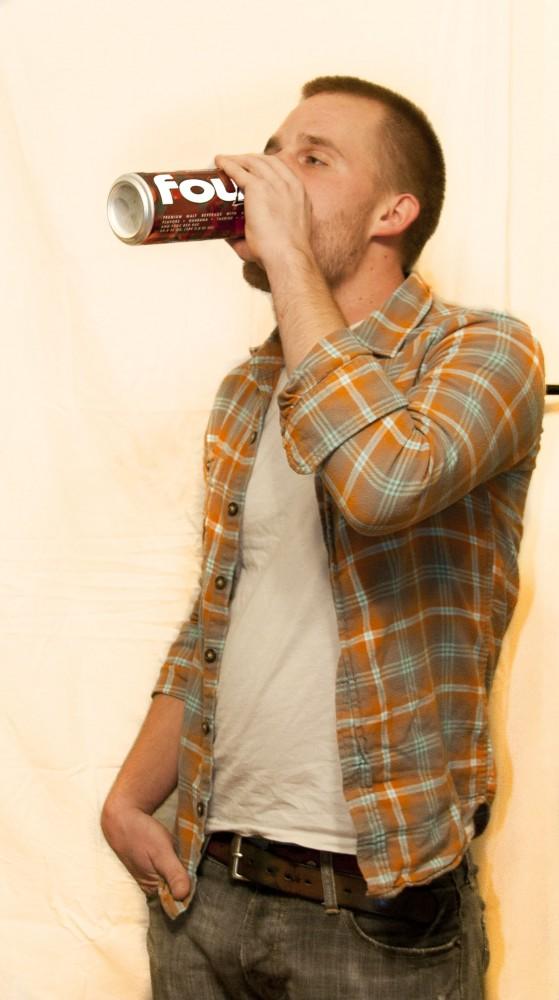Alcoholic energy drinks banned from Michigan

GVL Photo Illustration / Dylan Graham Four Loko alcoholic energy drink
Nov 8, 2010
The Michigan Liquor Control Commission has officially banned all alcoholic energy drinks. Manufacturers and distributors will have 30 days to remove the products in question from within state borders, though stores can continue selling their existing inventory of the drinks during the phase-out period. The ban will affect 55 products from four different manufacturers.
The decision was made in light of several studies regarding alcohol energy drinks, concern voiced by parent groups and the FDA’s decision to further investigate alcohol energy drink products.
According to the MLCC, the packaging is often misleading, and the products themselves can pose problems by directly appealing to a younger customer. The drinks also mix alcohol with various other chemical and herbal stimulants.
Additionally, the MLCC was concerned by several reports of college students becoming sick, some nearly dying, after consuming alcohol energy drinks. Last month, nine Central Washington University students were found passed out in a parking lot after consuming Four Loko, a fruit-flavored malt liquor also known as “blackout in a can.” Some of the students had BAC levels of up to .35 and appeared to be in such physical distress that police initially thought the students had been drugged. The event garnered national attention and widespread calls from health officials to ban the drinks.
Assistant director of the Department of Public Safety Capt. Brandon DeHaan said while he cannot “say with any certainty” drinks like Four Loko have been involved in alcohol poisoning cases at Grand Valley State University, he has noticed the drinks at parties and tailgating events.
“The university’s position is that we ask people to be responsible when they consume alcohol, and I think that a drink such as that may cloud their ability to do that and to be aware of how much they have actually consumed,” DeHaan said.
The caffeine in beverages like Four Loko suspends the effects of alcohol, allowing people to continue drinking long after they normally would have stopped consuming non-caffeinated alcohol, according to the MLCC. However, few studies have been able to successfully measure the physical effects of combining alcohol and caffeine, something the FDA is expected to examine before moving forward on any nationwide regulation.
“The Commission’s concern for the health, safety and welfare of Michigan citizens and the fact that there is not enough research to validate that these products are safe for consumption has made me believe that until further research is done by the FDA, they should no longer be on Michigan shelves,” MLCC Chairperson Nida Samona said in a press release. “Alcohol has been recognized as the number one drug problem among youth, and the popularity of alcohol energy drinks is increasing at an alarming rate among college students and underage drinkers.”
A typical alcohol energy drink is 24 ounces and has a 12-percent alcohol content, compared to a normal can of beer, which usually has an alcohol content ranging from 4 to 5 percent. In addition, energy drinks typically come in 16 or 24-ounce servings – much larger than a 10-ounce can of beer.
“It’s basically six alcoholic drinks in one can, which people are probably going to drink quickly,” Alcohol Campus Education Services Director Eric Klingensmith said. “Having six drinks in probably less than an hour, regardless of gender or size (of the drinker), is definitely a health concern.”
The higher alcohol content, coupled with larger serving sizes and a fruity flavor, can create a potentially dangerous situation, DeHaan said.
“My understanding of those drinks is that there is a high alcohol content, a sweet flavor, combined with a stimulant that can negate some of the depressive effects of alcohol,” DeHaan said. “So because of that sweet flavor it has, almost like a soda pop, those tend to go down very quickly.”
The MLCC initially considered changing label requirements for alcohol energy drinks to make them more distinguishable from non-alcoholic products like Red Bull and Rockstar. Concern was also expressed over the cans’ colorful labels, which the MLCC believes is intended to appeal to younger, and likely underage, drinkers. Ultimately, the Commission decided on a statewide ban instead.
“One can, one serving, is enough to get you intoxicated,” MLCC Commissioner Patrick Gagliardi said in a press release. “Alcohol energy drinks cost on average $2 – $5 per can making these products easily accessible and affordable.”
So far, Phusion Projects LLC of Chicago, the manufacturers of Four Loko, said they will not fight any bans or restrictions on their products.
“We are upset when our products are abused or consumed illegally by underage drinkers,” the company said in a statement. “Most would expect our company to disagree with recent decisions to ban our products from college campuses … (But) we agree with the goals that underlie those sentiments.”
According to 7-11 sales figures, Four Loko was the chain’s fourth-highest selling alcoholic beverage in 2009. The top seller was Joose, another alcohol energy drink.





















